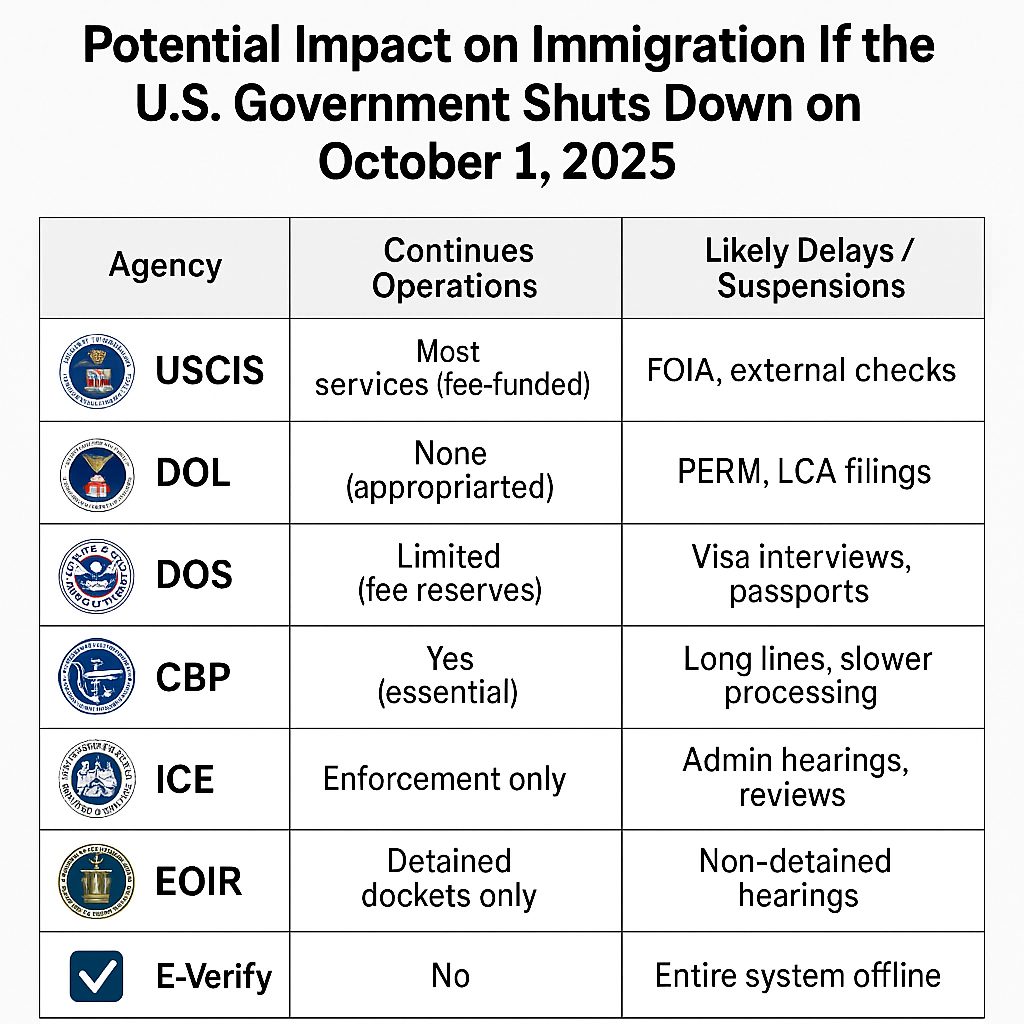A government shutdown on October 1, 2025—and the possible federal government shutdown’s implications— is sending shockwaves across federal operations, including the sprawling U.S. immigration system and the government agencies responsible for immigration processes. With millions of pending cases, global visa demand, and complex interagency coordination, even a partial shutdown could stall decisions, delay interviews, and heighten uncertainty for immigrants, employers, and families, as well as foreign nationals concerned about their ability to remain and work in the U.S.
In this comprehensive guide, we’ll break down what happens when funding lapses, how immigration matters are affected, explain which immigration services continue, and explore how major agencies — USCIS, DOL, DOS, CBP, and ICE — may be affected.

Understanding the 2025 Shutdown
What a Government Shutdown Means
A government shutdown occurs when Congress fails to pass a spending bill or continuing resolution or appropriations bill to fund federal agencies. When that happens, the Antideficiency Act prohibits agencies from operating except for “essential” functions tied to national security or public safety. A shutdown can also occur if a funding bill is not approved. When Congress passes an appropriations bill or funding bill, government operations can resume.
In immigration, some functions are fee-funded (continuing despite the lapse), while others depend directly on appropriated federal dollars and halt until funding resumes.
Immigration Attorney Richard Herman: “Not all immigration services shut down during a funding lapse — but critical operations like DOL certifications and visa interviews may.”
Why October 1, 2025 Is Critical
October 1 marks the start of the federal fiscal year. Since Congress did not reach a budget agreement or pass a stopgap measure, such as a stopgap spending measure, funding expired at midnight on September 30. Agencies like USCIS and CBP will turn to contingency plans, deciding which services stay open.

Political Context
The 2025 budget battle reflects deep partisan divides. Debates over immigration enforcement funding, border wall expansion, and humanitarian programs could stall negotiations — raising the odds of a temporary shutdown.
How Immigration Is Funded
- USCIS: This federal agency operates mostly on user fees from applications, meaning many services continue.
- DOL: This federal agency is funded by congressional appropriations, making it highly vulnerable.
- DOS: As a federal agency, it relies on fee revenue, but limited cash reserves can trigger partial closures.
- CBP & ICE: These federal agencies are largely funded through appropriations, with some “essential” exceptions.
Together, these agencies—USCIS, DOL, DOS, CBP, and ICE—are commonly referred to as immigration related agencies, each playing a key role in the immigration process and affected differently by funding mechanisms.
What Happens When the Government Shuts Down
During a shutdown, agencies divide staff into:
- Essential (excepted): Continue working (e.g., border patrol agents).
- Non-essential (furloughed): Temporarily sent home without pay. Federal employees who are furloughed during a shutdown are typically entitled to back pay once government funding is restored.
These changes can disrupt the immigration process, as the operational status of agencies like USCIS, USCBP, and DOS may affect the continuation of certain immigration services and delay case processing.
Historical Precedents
At the beginning of this section, it’s important to look at how past government shutdowns have impacted immigration agencies and services.
- 2013: 16-day shutdown halted DOL’s PERM system; USCIS stayed open.
- 2018–2019: Longest shutdown in U.S. history (35 days); thousands of visa interviews canceled; E-Verify suspended.
Immigration Attorney Richard Herman : “Most immigration services funded by application fees (like USCIS) continue, but others—like DOL labor certifications and DOS visa processing—often grind to a halt.”
USCIS During a Shutdown
Operations That Continue
Because USCIS is primarily fee-funded, core operations continue, including processing key immigration benefits such as:
- Naturalization, green card, work authorization, and change of status applications.
- Conducting biometrics and interviews, if offices remain staffed.
- Adjudicating EAD renewals and adjustment of status forms.
What May Slow Down
- Furloughed support staff (contractors, building management, FOIA units) can cause scheduling delays.
- Field office services like outreach or community events may pause.
- Interagency requests (e.g., FBI background checks) could face bottlenecks.
Impact on Applicants
Expect potential longer processing times, rescheduled appointments, and delays for cases needing external verifications. Applicants should be especially mindful of the filing deadline and submit immigration applications before a shutdown to avoid delays or disqualification.
Immigration Attorney Richard Herman: “USCIS remains open during shutdowns but may face slower response times and delayed adjudications for PERM labor certification.”
Visit USCIS for official updates
Department of Labor (DOL)
Why DOL Is at Risk
Unlike USCIS, the Department of Labor’s immigration-related divisions — including the Office of Foreign Labor Certification (OFLC) — depend on annual appropriations. These immigration functions are directly dependent on government funding, making them especially susceptible to shutdowns. If those funds lapse, electronic systems shut down.
Critical Programs Affected
- PERM Labor Certifications: PERM labor certification applications cannot be filed or processed, and no prevailing wage determinations are issued during a shutdown.
- Labor Condition Applications (LCAs) for H-1B: Frozen until funding resumes.
- H-2A/H-2B Certifications: Severe disruptions for seasonal employers.
Employer Consequences
Employers cannot file new H-1B or PERM-based green cards without DOL certifications, creating a domino effect that halts USCIS filings. Additionally, employers may encounter complications with filing fees for applications that cannot be submitted or processed during the shutdown.
Lessons from 2013 and 2018
Past shutdowns caused multi-week backlogs. DOL granted extensions post-reopening but warned of significant lost productivity. The impact of such a shutdown on immigration processes and agency backlogs can be widespread, affecting timelines and increasing uncertainty.
Immigration Attorney Richard Herman: “If DOL systems go dark, employers can’t submit LCAs or PERM cases — freezing many employment-based green card and visa filings.”
Department of State (DOS)
Visa Services Abroad
The State Department’s Bureau of Consular Affairs operates mainly through visa and passport fees. However, local posts rely on discretionary support funds, meaning the processing of visa and passport applications by DOS is fee-funded and should continue during a shutdown.
- Large embassies (e.g., London, New Delhi) may stay open briefly.
- Smaller consulates could close if reserves dry up.
During a shutdown, embassies may prioritize processing of diplomatic visas and emergency services over routine visa applications.
Potential Delays
Expect significant slowdowns or suspensions for:
- Nonimmigrant visas (NIVs): H-1B, F-1, B-1/B-2, L-1.
- Immigrant visas (IVs): Family-based and employment-based green cards.
- K-1 fiancé visas: Delayed interviews and packet processing.
Additionally, while passport operations are typically fee-funded, they may also experience delays or limited availability during a prolonged shutdown.
Travel Ripple Effects
Canceled appointments can cause backlogs months later, affecting travel, employment start dates, and family reunification.
Immigration Lawyer Richard Herman: “A prolonged shutdown could delay U.S. visa appointments worldwide.”
Customs and Border Protection (CBP)
Essential but Stretched
CBP’s frontline personnel — including officers at ports of entry and Border Patrol agents — are excepted employees who must report to work, even without pay.
Operational Challenges
- Staff shortages as unpaid agents seek other work or face morale issues.
- Longer processing times at airports and land crossings.
- Secondary inspections and I-94 updates may experience delays.
- Global Entry and NEXUS enrollments may pause.
Trade and Travel
Commercial traffic may slow, increasing economic costs across supply chains.
Immigration Lawyer Richard Herman: “CBP stays open, but expect longer lines and fewer staff during a shutdown.”
Immigration and Customs Enforcement (ICE)
What Continues
ICE is primarily funded by appropriations but classifies enforcement operations as essential. As a result:
- Arrests, detentions, and deportations continue.
- Investigations into criminal activity proceed.
What Slows
- Court hearings for non-detained individuals may stop.
- Administrative reviews and case processing can be delayed.
- Staffing shortages may affect detainee welfare and transport.
Legal and Ethical Concerns
Past shutdowns raised questions about due process for detainees as hearings were postponed indefinitely.
Immigration Lawyer Richard Herman: “ICE enforcement doesn’t stop—but courts, paperwork, and hearings may stall.”
Immigration Courts and EOIR
Which Courts Close
The Executive Office for Immigration Review (EOIR) — operating under the Department of Justice — halts operations for non detained docket cases when funds lapse. These non detained docket cases are paused and rescheduled for a later date once funding resumes. Non-detained immigration court hearings will be postponed and rescheduled for a later date during a government shutdown. Detained courts stay open as essential.
Impact on Backlogs
Every day closed adds thousands of postponed hearings. In 2019, nearly 80,000 cases were delayed.
Consequences for Asylum and Removal
- Non-detained hearings: Canceled or rescheduled months later.
- Detained hearings: Continue under essential staffing. Immigration court cases on the detained docket will continue during a government shutdown, while non-detained docket cases will be reset for later.
- Legal counsel: Many attorneys face uncertainty about court dates.
Immigration Lawyer Richard Herman: “Non-detained immigration court hearings are often postponed during shutdowns, worsening backlogs.”
E-Verify and Employer Compliance
Automatic Suspension
The E-Verify system — used by employers to confirm work authorization — shuts down during a funding lapse.
Employer Guidance
- Employers cannot initiate new cases.
- Deadlines are extended until the system returns.
- Employers must maintain I-9 compliance manually.
Immigration Lawyer Richard Herman: “E-Verify is suspended during shutdowns, but employers won’t be penalized for delayed verifications.”
Real-World Impacts for Immigrants
Applicants Waiting on USCIS
- Interview delays and extended processing times for immigration applications, including green cards, citizenship, and EADs (work permits).
- FOIA requests and customer service response times drop.
Students and Scholars
- F-1/J-1 students needing SEVIS updates or DS-2019 reissuance may face delays if SEVP coordination is impacted.
Workers and Employers
- H-1B and PERM-dependent workers stuck in limbo due to DOL shutdown. Shutdowns can disrupt key immigration processes for both employers and foreign workers, causing delays in visa applications, filings, and other essential steps.
- Portability issues for workers changing employers.
Families
- Visa interviews canceled abroad cause long separations.
- Adoption and refugee processing may halt.
Lessons from Past Shutdowns
2013 Shutdown
- DOL’s PERM system offline for 16 days.
- Backlogs extended into early 2014.
2018–2019 Shutdown
- Lasted 35 days, the longest in history.
- Visa interview cancellations reached tens of thousands.
- E-Verify offline; ICE courts limited to detained cases.
Immigration Law Expert Richard Herman: “Past shutdowns show that even short funding lapses ripple across the immigration system for months.”
How to Prepare for a Possible 2025 Shutdown
For Immigrants
- File early: Submit applications before September 2025.
- Attend all scheduled interviews: Rescheduling may take months.
- Keep records: Save receipts, notices, and case numbers.
For Employers
- Certify LCAs and PERMs early.
- Monitor USCIS and DOL websites daily for status changes.
- Communicate with foreign employees about possible delays.
For Attorneys and Advocates
- Track EOIR court closures.
- Advise clients on continuances.
- Document any prejudice caused by the shutdown for future motions.
Immigration Law Commentator Richard Herman: “Preparation and proactive filing can minimize disruption if a shutdown occurs.”
What Might Be Different in 2025
Technology and Automation
The 2025 immigration landscape features:
- USCIS ELIS (Electronic Immigration System): More digital resilience, but interagency dependencies remain.
- AI-driven triage systems for case management could limit backlogs — if staffed.
Political Priorities
The current administration’s enforcement-first strategy could prioritize ICE and CBP funding, leaving humanitarian and adjudicative services under strain.
Partial Funding Measures
Congress may approve temporary continuing resolutions to keep visa services afloat, but uncertainty remains high.
Key Takeaways
| Agency | Continues Operations | Likely Delays / Suspensions |
|---|---|---|
| USCIS | Most services (fee-funded, including immigrant petitions such as I-130 and I-140) | FOIA, external checks |
| DOL | None (appropriated) | PERM, LCA filings |
| DOS | Limited (fee reserves) | Visa interviews, passports |
| CBP | Yes (essential) | Long lines, slower processing |
| ICE | Enforcement only | Admin hearings, reviews |
| EOIR | Detained dockets only | Non-detained hearings |
| E-Verify | No | Entire system offline |
Immigration Commentator Richard Herman: “In short, a 2025 shutdown wouldn’t close all immigration offices—but expect major slowdowns, especially at DOL, DOS, and EOIR.”

FAQs: Potential Immigration Impacts of a 2025 U.S. Government Shutdown
Will USCIS close if the government shuts down on October 1, 2025?
No. The U.S. Citizenship and Immigration Services (USCIS) will remain open during a shutdown because it is primarily funded by application and petition fees, not by congressional appropriations. However, certain services dependent on outside agencies — such as background checks — may experience delays, and processing times could slow due to limited staffing or furloughed contractors. Various immigration processes, such as visa issuance and court hearings, may be delayed or paused during a shutdown.
Will USCIS interviews and biometrics appointments be canceled?
Most scheduled USCIS interviews, biometrics, and oath ceremonies will continue as planned. If a field office is located in a federally owned building that closes, appointments may be rescheduled. Applicants should check their local office’s operational status before traveling.
How will a shutdown affect USCIS case processing times?
While USCIS will stay open, a shutdown can extend processing times for cases that require coordination with other agencies, such as FBI security checks or Department of State clearances. This may result in delayed adjudications for green cards, work permits, and naturalization applications.
Can I still file new applications or renewals with USCIS during a shutdown?
Yes. USCIS will continue to accept and process new applications. Online filing remains operational, and mail-in applications will be accepted. However, response times may increase, and case updates could take longer to appear.
What happens to USCIS customer service during a shutdown?
The Contact Center may operate with reduced staffing, causing longer wait times. In-person InfoPass appointments might be limited if building access or contractor availability is affected.
What happens to DOL immigration functions during a shutdown?
The Department of Labor (DOL) relies entirely on appropriated funds, meaning its immigration-related services — including the Office of Foreign Labor Certification (OFLC) — will likely shut down completely. No PERM, LCA, or prevailing wage determinations can be processed until funding is restored.
Can employers file PERM applications or LCAs during a DOL shutdown?
No. During a funding lapse, the DOL’s Foreign Labor Application Gateway (FLAG) system will be offline. Employers cannot file new or pending PERM applications or Labor Condition Applications (LCAs) needed for H-1B petitions. This will halt many employment-based immigration filings.
How will a DOL shutdown affect H-1B or green card cases?
Since H-1B petitions and employment-based green cards require certified LCAs and PERMs, employers will be unable to proceed with filings during a shutdown. This could delay new hires and green card sponsorships for weeks or months. If you are an international student concerned about your status, you can explore your options after SEVIS termination.
Will the Department of State continue visa services abroad?
The Department of State (DOS) operates its visa and passport services mainly through user fees, allowing some continued operations. However, embassies and consulates with limited fee reserves may slow or suspend services after several weeks.
Will my visa interview abroad be canceled during a shutdown?
Possibly. If a consular post runs out of reserve funds, it may cancel or reschedule visa appointments. Applicants should monitor embassy announcements and be prepared for extended wait times once operations resume.
Are U.S. embassies and consulates open during a shutdown?
Many embassies will remain open initially, but smaller consulates may close temporarily if they lack funds. Priority will be given to emergency and diplomatic services over routine visa processing.
Will visa issuance or passport printing be delayed?
Yes. Even if applications are accepted, printing and security clearances could be delayed if furloughed personnel or interagency dependencies are involved. Applicants may face longer wait times for visas or passports.
Will CBP remain operational at airports and border crossings?
Yes. U.S. Customs and Border Protection (CBP) officers are deemed essential and will continue working during a shutdown. All ports of entry, airports, and border crossings will remain open, but travelers should expect slower processing.
Will travelers face delays entering the U.S. during a shutdown?
Likely yes. CBP agents will continue inspecting arrivals, but staffing shortages and morale issues could lead to longer lines and wait times at airports and land crossings.
Will Global Entry or Trusted Traveler Programs operate during a shutdown?
Enrollment and interview centers for Global Entry, NEXUS, and SENTRI may pause operations due to reduced staffing. Previously scheduled interviews could be postponed.
Will CBP still issue I-94s and process entry stamps?
Yes. I-94 records will continue to be issued electronically. However, manual corrections or review requests might take longer if staffing is reduced.
Does ICE continue enforcement during a government shutdown?
Yes. Immigration and Customs Enforcement (ICE) classifies enforcement operations as essential, meaning arrests, detentions, and deportations will continue. However, administrative hearings, reviews, and non-critical support functions may slow.
Will ICE detention centers remain open during a shutdown?
Yes. Detention facilities will remain operational, as they are considered part of essential law enforcement. However, reduced administrative staff could affect case processing and access to counsel.
Will ICE continue deportation flights during a shutdown?
Yes. Deportations will continue, especially for detainees with final removal orders. ICE’s enforcement priorities may shift to detained or criminal cases during limited operations.
Will immigration courts (EOIR) close during a shutdown?
The Executive Office for Immigration Review (EOIR) will pause non-detained court operations during a shutdown. Only detained docket cases — involving individuals held in custody — will continue.
Will my immigration hearing be canceled?
If you are not in detention, your hearing will likely be canceled and rescheduled. During the 2019 shutdown, tens of thousands of cases were postponed, contributing to a massive backlog.
How can I check if my immigration court is open?
EOIR will issue public updates for each court’s status. Courts handling detained dockets stay open, while non-detained cases are placed on hold.
Will asylum or removal cases continue during a shutdown?
Only detained asylum and removal cases proceed. All non-detained cases, including affirmative asylum interviews, are generally postponed.
Does a shutdown affect appeals before the BIA?
Yes. The Board of Immigration Appeals (BIA) may suspend processing of non-detained appeals during a funding lapse. Only urgent matters related to detained cases will move forward.
No. The E-Verify system will be suspended during a shutdown. Employers will be unable to initiate new cases or confirm employment eligibility until the system reopens. If the E-Verify system is unavailable during a shutdown, employers must manually complete I-9 Forms for new hires and create E-Verify cases later. If you are preparing for U.S. naturalization, you may find this [LINK 1] helpful.
No. The E-Verify system will be suspended during a shutdown. Employers will be unable to initiate new cases or confirm employment eligibility until the system reopens. If you are preparing for U.S. naturalization, you may find this US Citizenship Test: Key Questions and Answers Guide helpful.
How should employers handle E-Verify deadlines during a shutdown?
Employers will not be penalized for missing deadlines while E-Verify is offline. USCIS typically issues post-shutdown guidance granting grace periods for delayed verifications.
Can employers still complete I-9 forms during a shutdown?
Yes. Employers must still complete Form I-9 for new hires within the standard timeframe. However, they should defer E-Verify checks until the system returns.
What happens to federal immigration contractors during a shutdown?
Private contractors supporting USCIS, CBP, or ICE may be furloughed, causing technical delays in data entry, mailroom operations, and IT systems.
How long before shutdown impacts are felt across the immigration system?
Some disruptions occur immediately (e.g., DOL filings, E-Verify). Others, like visa delays or court backlogs, compound over days or weeks.
If the shutdown ends, how quickly do services resume?
Once funding is restored, most agencies resume operations within 24–48 hours, but backlogs persist. Agencies may take weeks or months to process the accumulated workload.
How will a 2025 shutdown differ from past shutdowns?
In 2025, digital systems like USCIS ELIS and AI-assisted case triage may keep some processes running remotely. However, human review bottlenecks and interagency dependencies will still cause delays.
Could the administration prioritize certain immigration services?
Yes. DHS may issue guidance prioritizing enforcement operations, while adjudicative and humanitarian services face greater disruption.
What steps can immigrants take to prepare for a possible shutdown?
- File applications early, before September 2025.
- Attend all scheduled interviews.
- Save all receipts and notices.
- Monitor official websites daily.
- Consult an immigration attorney if deadlines approach.
What should employers do before a potential shutdown?
- File PERM and LCA applications early.
- Keep communication open with foreign employees.
- Document impacts for potential extensions or appeals.
Will humanitarian programs like asylum or TPS be affected?
Yes, especially for affirmative asylum interviews and non-detained cases, which may be postponed. However, detained and emergency matters will continue.
How will a shutdown affect green card interviews or citizenship ceremonies?
USCIS offices may still hold green card interviews and naturalization ceremonies, but delays are possible if local offices experience staff shortages or building closures.
Can I contact USCIS or other agencies during a shutdown?
Yes, but expect longer response times. Many hotlines and email addresses will have reduced staffing or automated replies.
Is it safe to travel internationally during a government shutdown?
Yes, but expect delays if visa stamping or CBP processing is required. Always carry proof of status, such as approval notices or advance parole documents.
Will a shutdown affect immigration fee increases or rule changes?
A shutdown may delay implementation of pending regulations or fee adjustments, since agency rulemaking and publication require active staff.
Could Congress pass temporary funding just for immigration services?
Possibly. In prior shutdowns, continuing resolutions have provided short-term funding for critical visa and border operations.
What is the bottom line for immigrants during a 2025 shutdown?
Most USCIS functions will remain open, but DOL, DOS, and EOIR will see major slowdowns. Expect delays, backlogs, and uncertainty — and plan ahead wherever possible.
Immigration Advocate Richard Herman: “In short, a 2025 shutdown won’t close every immigration agency — but expect DOL, DOS, and EOIR delays to ripple across the system for months.”
Get Trusted Immigration Guidance Before the October 1, 2025 Shutdown
If you’re concerned about how a potential government shutdown on October 1, 2025 might impact your immigration case, visa, work authorization, or green card application, now is the time to act. With agencies like USCIS, DOL, DOS, CBP, ICE, and EOIR preparing for possible funding lapses, even a short shutdown could delay applications, freeze filings, and create uncertainty for immigrants, employers, and families across the U.S.
When government systems slow down, you need an advocate who has seen it all. Attorney Richard T. Herman, founder of the Herman Legal Group, is a nationally recognized immigration lawyer with more than 30 years of experience guiding clients through the most complex policy changes — including prior federal shutdowns.
He is also co-author of the acclaimed book Immigrant, Inc., a powerful exploration of how immigrants drive innovation, entrepreneurship, and economic growth in America. As a champion for immigrant rights and a lifelong evangelist for the power of diversity and inclusion, Richard brings unmatched insight, compassion, and strategy to every client relationship.
Bottom line: A government shutdown can disrupt your immigration journey — but with the right legal guidance, you can stay protected, informed, and prepared.
Don’t wait for backlogs, canceled interviews, or E-Verify suspensions. Get ahead of the uncertainty with a trusted advocate by your side.
📞 Call the Herman Legal Group today at 1-216-696-6170 to speak directly with an immigration attorney, or
💻 Schedule your confidential consultation online before the shutdown begins.
Comprehensive Resource List: Potential Impact of a Government Shutdown on U.S. Immigration (October 1, 2025)
Cross-Agency & Official Guidance
- Office of Management and Budget (OMB) – Agency Contingency Plans
The central repository where all federal agencies post their updated shutdown contingency plans, outlining which services continue or pause during a funding lapse. - Department of Homeland Security (DHS) – Procedures Related to a Lapse in Appropriations (2025)
DHS’s official shutdown framework, explaining how USCIS, CBP, and ICE handle operations during a funding lapse. - Congressional Research Service (CRS) – Government Shutdowns and Executive Branch Operations (2025)
A comprehensive legal and policy analysis of how federal shutdowns affect executive agencies, including immigration components. - Committee for a Responsible Federal Budget – Shutdown Q&A
A nonpartisan, plain-language explainer detailing the mechanics and consequences of federal shutdowns.
U.S. Citizenship and Immigration Services (USCIS)
- USCIS – Official Website & Shutdown Updates
The best source for real-time updates on processing delays, office closures, and service availability. USCIS is fee-funded, but some services may still experience slowdowns. - E-Verify – Official Program Website
The system employers use to confirm work authorization. During a shutdown, E-Verify is suspended, and guidance on how to handle pending cases is posted here. - Society for Human Resource Management (SHRM) – What Employers Should Know During a Shutdown
HR compliance guidance for employers navigating E-Verify delays or Form I-9 obligations during a lapse.
Practice Tip: USCIS typically issues grace period notices after E-Verify reopens, allowing employers to backdate compliance actions.
Department of Labor (DOL)
- DOL – Office of Foreign Labor Certification (OFLC)
The hub for PERM labor certifications, LCAs, and prevailing wage requests. Expect a complete pause during a shutdown since OFLC is appropriation-funded. - OFLC News & Announcements
Where DOL posts public notices about system outages or FLAG portal downtime. - OFLC Performance & Data Reports
Offers insight into backlog metrics and case volumes, useful when estimating post-shutdown recovery times. - OFLC FAQs (Printable)
Detailed policy explanations on PERM, LCA, and prevailing wage processes for employers and attorneys.
Note: During prior shutdowns, no DOL cases were processed, halting H-1B and employment-based green card filings.
Department of State (DOS)
- Travel.State.Gov – U.S. Visas
The primary portal for visa application status, appointment updates, and embassy/consulate operations. - DOS 2024 Shutdown Guidance (Example)
Provides a preview of how DOS prioritizes emergency services (e.g., lost passports, diplomatic travel) over routine visa interviews during a funding lapse. - Historic DOS Statement (2011)
A prior shutdown advisory that helps understand the precedent for consular slowdowns during extended funding gaps.
Larger consulates may remain open temporarily using fee reserves, but smaller posts could suspend visa operations within weeks.
Customs and Border Protection (CBP)
- CBP – Newsroom
Source for port-of-entry announcements, staffing updates, and border operations under essential-service designations. - CBP – Policy and Directive Library
Contains official bulletins and operational memos clarifying how CBP handles traveler screening and border staffing during lapses.
Note: CBP officers remain on duty, but travelers should anticipate slower inspection times and reduced customer service availability.
Immigration and Customs Enforcement (ICE)
- ICE – Official Website & Field Office Directory
Covers enforcement, detention, and removal operations. Most functions are considered essential and continue through a shutdown. - ICE Annual Report FY2024
Outlines recent enforcement priorities, staffing, and detention metrics — helpful for understanding operational baselines. - ICE Annual Report FY2023
Provides prior-year context for enforcement volumes and budget dependencies.
ICE field operations typically continue, but administrative reviews and non-detained docket support may pause.
Immigration Courts / Executive Office for Immigration Review (EOIR)
- EOIR – Immigration Court Operational Status
Live tracker of court closures, hearing postponements, and detained docket updates during a funding lapse. - EOIR – Court Information Page
Provides hotline and case-status lookup tools for individuals checking if their hearing remains scheduled. - EOIR 2013 Shutdown Notice (Archived)
Historical document showing EOIR’s “detained only” policy during prior shutdowns — a likely reference for 2025 planning.
Non-detained hearings are paused, worsening backlogs and delaying asylum and removal cases.
Employer & HR-Focused Resources
- E-Verify Official Site
Check real-time system status and access shutdown-specific compliance guidance. - SHRM – Government Shutdown & E-Verify
Guidance for HR professionals on managing Form I-9 obligations when E-Verify is unavailable. - Equifax Workforce Solutions – HR Compliance Steps During E-Verify Outages
Employer-facing checklist outlining steps to maintain compliance and document due diligence.
Professional Associations & Practitioner Alerts
- American Immigration Lawyers Association (AILA) – Practice Alert: What Happens If the Government Shuts Down?
AILA’s practice advisory detailing what immigration lawyers and clients should expect during a funding lapse. - EveryCRSReport – Shutdown Effects on Agencies
A public archive of Congressional Research Service reports explaining shutdown implications across federal agencies. - U.S. Travel Association – Funding Lapse and Travel System Impacts
Analysis of how a shutdown affects air travel, visa issuance, and border inspection throughput.
Media, Policy, and Data Context
- Federal News Network – OMB: Plans Posted on Each Agency Website
Confirms that as of 2025, each agency must host its own contingency plan — no central federal shutdown archive. - USAFacts – Government Shutdown 2025: What to Know
A data-rich explainer with graphics illustrating how shutdowns affect federal operations and economic output.








